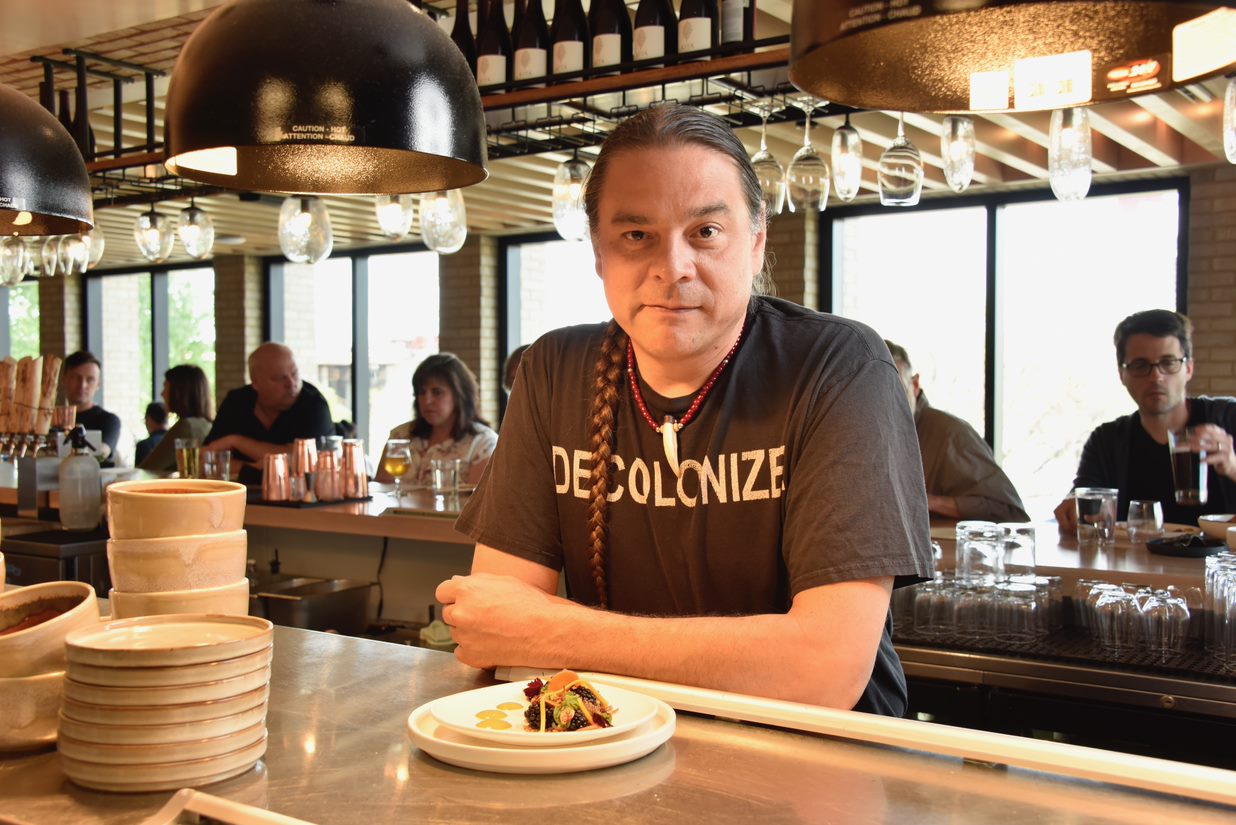
- Details
- By Kaili Berg
Sean Sherman, an Oglala Lakota chef and the driving force behind the nonprofit North American Traditional Indigenous Food Systems (NATIFS), has been named to The Independent’s inaugural Climate 100 List.
This recognition highlights Sherman's dedication to revitalizing Indigenous foodways and promoting sustainable practices deeply rooted in traditional ecological knowledge.
The Climate 100 List, launched by the UK and US-based news outlet The Independent, aims to annually recognize activists, innovators, scientists, policymakers, and other leaders at the forefront of the fight against climate change.
This year’s event will take place during the United Nations Summit of the Future in New York City, as part of the 15th annual NYC Climate Week. Former British Prime Minister Theresa May is set to deliver the keynote address on September 25.
As the founder and executive director of NATIFS, Sherman works to restore and elevate Indigenous food systems while promoting health and sustainability in Indigenous communities.
Through NATIFS and its premier project, the Indigenous Food Lab, Sherman and his team of chefs, educators, and advocates are reviving the traditional food practices that have sustained Native communities for generations.
Last year, Sherman took this mission global when he spoke at the United Nations Framework Convention on Climate Change (UNFCCC) Conference of the Parties (COP28) in Dubai.
Sherman emphasizes that Indigenous food systems hold key solutions to combating the impacts of climate change. These systems, built on traditional ecological knowledge passed down through generations, emphasize balance with nature and sustainable living practices.
“It’s an honor to see my name alongside the other passionate visionaries, leaders, and fighters on The Independent’s Climate 100 List,” Sherman said in a press release. “Indigenous communities face displacement and devastation from climate change, though we benefited least from the forces that created it, and we are custodians of knowledge that can light a better path going forward. I hope my place on the list carries the message of my nonprofit, NATIFS, to everyone looking for a way forward: Indigenous foodways once supported healthy individuals, stable communities, and balance in the natural world. Recovering these foodways and sharing knowledge and meals with one another is key to reconnecting and rebuilding what has been broken.”
Sherman’s restaurant Owamni, located in Minneapolis, is widely celebrated for its dedication to Indigenous ingredients and sustainable practices, earning him and his team a James Beard Award.
His work through NATIFS and Owamni has garnered global attention, positioning him as a leading advocate for Indigenous culinary traditions and their relevance in the climate change conversation.
The Independent, a well-known digital news platform, created the Climate 100 List to highlight those making a real difference in addressing climate change. Sean Sherman’s inclusion on the list highlights the vital role Indigenous knowledge and food practices play in shaping a sustainable future.
More Stories Like This
Gwich'in Tribal Governments Submit Comments Challenging Fish and Wildlife Service's Inadequate Environmental Review of Arctic Refuge Snow RoadRappahannock Tribe Challenges 9M-Gallon Water Plan
Feds release draft long-term plans for Colorado River management
Apache Leader Walks 60 Miles to Court Hearing That Will Decide Fate of Sacred Oak Flat
Rappahannock Tribe Raises Sovereignty and Environmental Concerns Over Caroline County Water Permit
Help us defend tribal sovereignty.
At Native News Online, our mission is rooted in telling the stories that strengthen sovereignty and uplift Indigenous voices — not just at year’s end, but every single day.
Because of your generosity last year, we were able to keep our reporters on the ground in tribal communities, at national gatherings and in the halls of Congress — covering the issues that matter most to Indian Country: sovereignty, culture, education, health and economic opportunity.
That support sustained us through a tough year in 2025. Now, as we look to the year ahead, we need your help right now to ensure warrior journalism remains strong — reporting that defends tribal sovereignty, amplifies Native truth, and holds power accountable.
 The stakes couldn't be higher. Your support keeps Native voices heard, Native stories told and Native sovereignty defended.
The stakes couldn't be higher. Your support keeps Native voices heard, Native stories told and Native sovereignty defended.
Stand with Warrior Journalism today.
Levi Rickert (Potawatomi), Editor & Publisher


